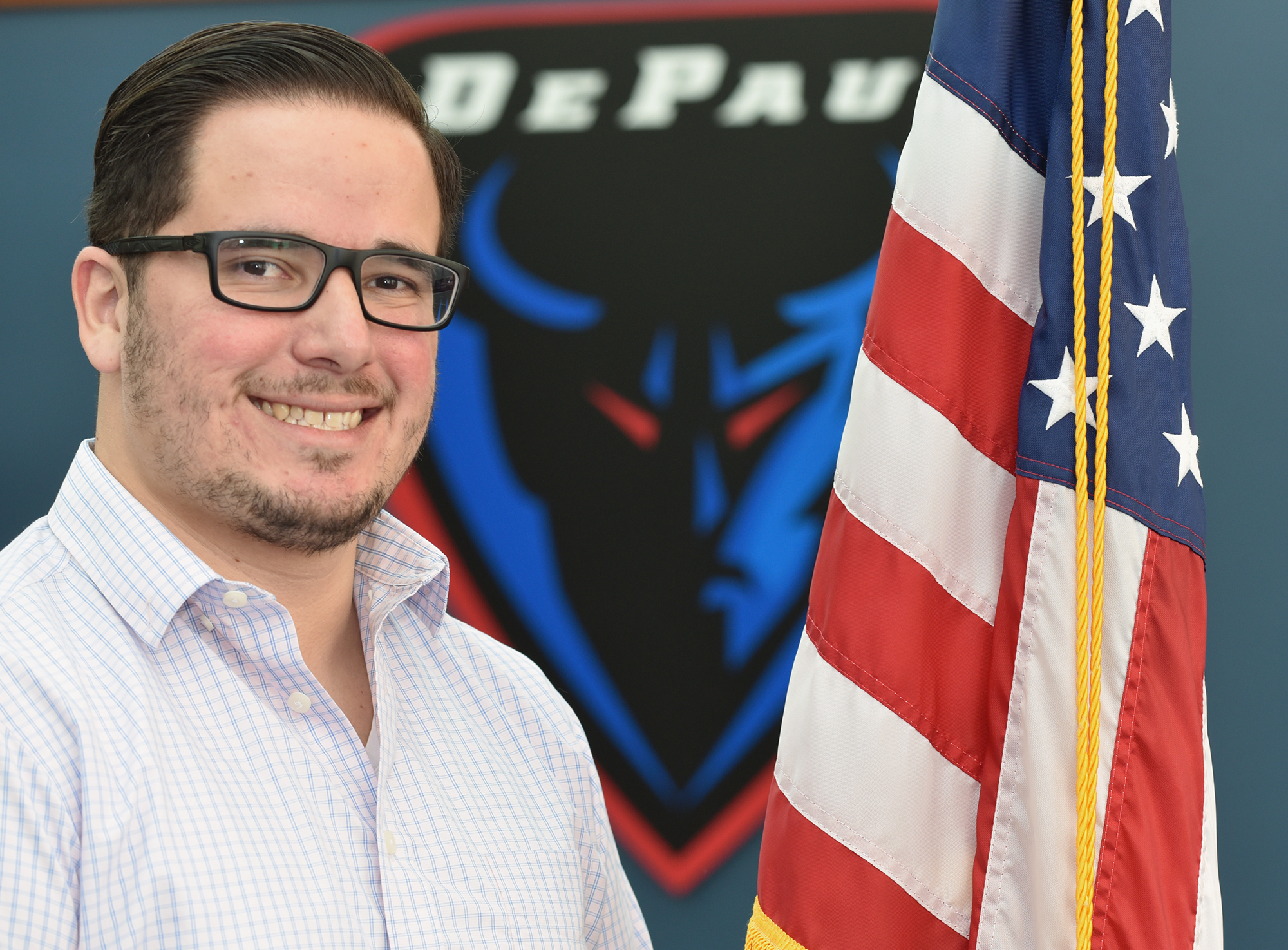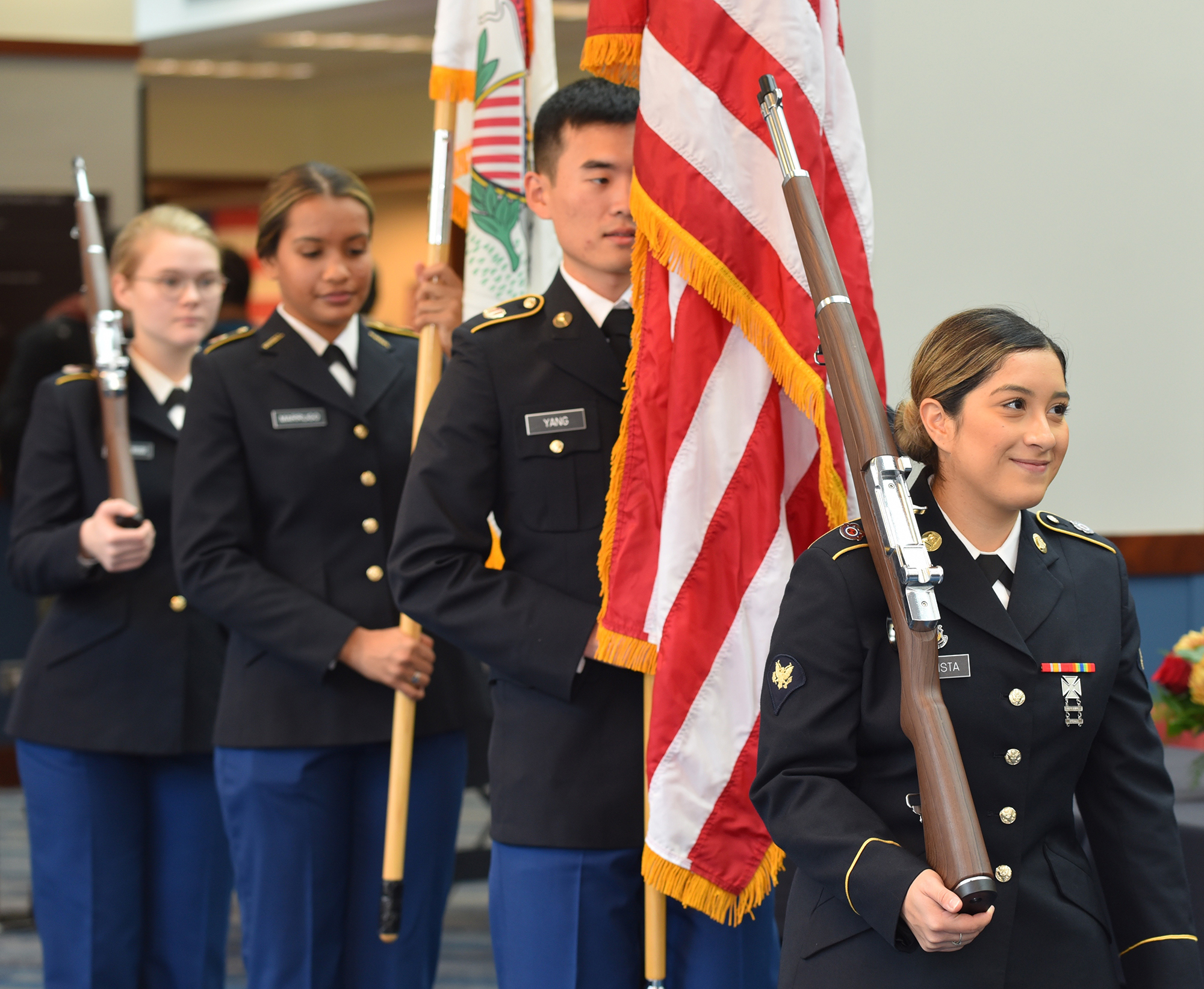 Business major and U.S. Marine Corps veteran Matthew Sanchez serves as a veterans' liason for DePaul's Office of Student Affairs.
Business major and U.S. Marine Corps veteran Matthew Sanchez serves as a veterans' liason for DePaul's Office of Student Affairs.Business major Matthew Sanchez came to DePaul University to study leadership and change management last year with experience that had already put him on the leadership path. Sanchez served for four years in the U.S. Marine Corps before enrolling in DePaul after his tour of duty ended.
Today Sanchez serves as a veterans’ liaison for DePaul’s Office of Student Affairs. In this Q&A, he discusses his experience as a student at the Driehaus College of Business and how he is helping other veterans transition to academic life at DePaul.
Why did you decide to study business?
While I was in the Marine Corps I was known as the “tax Marine.” I was good at helping people with their money and making a budget as well as with taxes. From this I learned two things: I was a good problem solver and I could help people learn to change habits. So, when I started at DePaul, I was a business administration major. I did this because it was very broad and applicable to many areas of business. After my first year I decided I wanted to stay in the business school, but I wanted to narrow my study focus. I looked through a list of majors, specifically at management, to see what aligned with my skill set. I came upon the management major that concentrated in leadership and change, which was right up my alley.
How is the college experience different for veterans?
The college experience can be very different for most veterans compared to their traditional student counterparts. This can vary with age, time in service, family status and several things. One commonality among all veteran students is their life experience.
Most veteran students who are starting school are 22 or 23—on the younger side—and have experienced things most 20-somethings don’t have the opportunity to. These veterans have been in leadership positions, have rapidly matured, and have experienced combat and loss all over the short span of four years. When these veterans start school, they are focused on the task at hand and are ready to translate these skills they have acquired into real world working skills.
On the flip side, you can have veteran students who are 30-plus who served for an extended period and have families and other responsibilities along with school. These veterans sharpened those same skills over a longer period in the service and now want to transition into roles in the civilian world. What sets these students apart from even some of the younger veterans is their lack of time. These students have jobs and families to care for while also attending school and don’t have the luxury of being able to just focus on school alone. Veteran students bring a different perspective to the classroom that’s grounded in life and world experience.
As a liaison, how do you help veterans transition into DePaul?
 Sanchez helps plan veteran events at DePaul throughout the year, including a Veterans Day Luncheon held on Nov. 6.
Our office
Sanchez helps plan veteran events at DePaul throughout the year, including a Veterans Day Luncheon held on Nov. 6.
Our office does several things to help veteran students in all aspects of their college life. Our main role is helping students with using their G.I. Bill benefits. We act as an intermediary between DePaul, Veteran’s Affairs and students. Using G.I. bill benefits at times can be very complex and confusing, so our office helps students understand how to best use those benefits.
Another part of our job is hosting events throughout the year for the veteran and DePaul community. These can range from Veterans Day and Memorial Day events, job fairs and resume workshops. We use the events to communicate and build community among veterans and the rest of the DePaul community. I particularly enjoy the job fair and networking events because we can get our students in front of employers that are looking specifically for veteran students and understand what they have to offer.
Tying it all together, we offer a peer advising service where we can help guide students through college. We help connect them to resources in and outside of DePaul, as well as build a road map to graduation and to getting employed during their time here.
Many veteran students come to DePaul with some form of college credit and typically start as a sophomore. Because of their shorter time period at DePaul, students must learn how to be successful in college while also learning how to search for internships and jobs for post graduation. Our office can provide guidance on best practices and resources to help students with tackling all these things at once.
Your biography mentions that you like to guide other veterans on how to “implement their military training into their schoolwork and future career paths.” What advice do you give veterans on how their training could apply to studying and pursuing careers in business?
Many of the skills that veterans learn in the military are applicable in the business world and classroom settings. A lot of times veterans don’t fully grasp how these skills translate and it takes a different perspective to help. For instance, I served as an artillery cannon crewman in the Marine Corps, and a lot of those technical skills do not directly translate to business or really anything else besides artillery. However, the leadership, the resource management and the ability to overcome unforeseen obstacles do translate very well.
My goal is to help veteran students understand that they can leverage a lot of those same skills from the military in the corporate world.